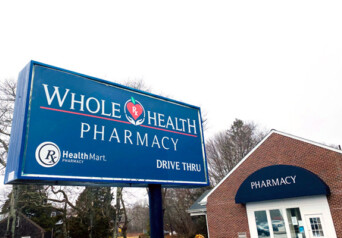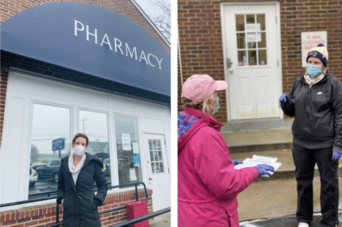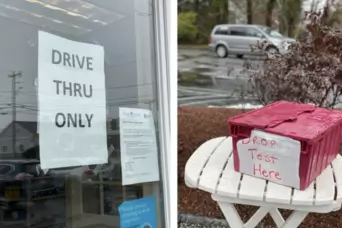Small Business Advocacy Independent pharmacies play an important part in the fight against COVID-19, but are being stifled by corporate power
Independent pharmacies are struggling to survive due to corporate consolidation and anti-competitive practices. This is bad for patients and communities.

- Post Date
- Tue, Feb 2
- Small Business Advocacy
Independent pharmacies not only play a key role in our health care but like other local businesses, they are an important part of our local economies and communities. Unfortunately, because of corporate control of their industry, many of them have been facing increasing costs, a reduction in income and are fighting to keep their doors open. The negative impacts of corporate consolidation in general have been exposed repeatedly throughout the coronavirus pandemic, but when it came to access to COVID-19 testing and vaccine distribution, it can be devastating for communities.
Independent pharmacists serve as our country’s most accessible healthcare providers, they dispense medications, provide immunizations, and offer conveniences like home delivery. Studies show that independent pharmacies outperform their corporate chain counterparts in many ways: they provide more one-on-one consultation with patients, shorter wait times, and lower prices. They also support their communities in a deeper way: Massachusetts is home to 169 independent community pharmacies, that like other local businesses keep more of their earnings in the local economy – an estimated $517 million annually.

To the owner of Whole Health Pharmacy, Cape Cod’s only independently operated public pharmacy, Karryn Lewis, “it’s not just a prescription fill, it’s a connection to the community.” Because she says, “people crave a personal connection,” so she and her team take their time to provide a level of service that has gotten lost in a corporate environment. “In larger pharmacies most of the time you are just a number.”
Like many independent pharmacists across the country during the COVID-19 crisis, Karryn and her staff continued to work on the front lines as experts who are committed to and care about the Cape Cod community. With the help of a few dedicated volunteers, Whole Health performed free COVID-19 testing for months (a service they provide, but do not profit from); performing up to 100 tests per day, three days a week.
When it comes to the COVID-19 vaccine however, Karryn was not able to participate in the distribution in a significant way, not because she doesn’t want to, but because like most states across the country, Massachusetts is relying on big pharmacy chains CVS and Walgreens to get shots in arms. Massachusetts is also lagging behind much of the country in its vaccine roll out.
It is surprising to many that the state that has been the most successful at getting vaccines out to their population was West Virginia, but for Douglas Hoey, CEO of the National Community Pharmacists Association, he was not at all surprised. “The states that [were] most effective right now [were] states that [sic] engaged community pharmacies in their vaccine programs.” Rather than relying on national chains, West Virginia instead worked with 250 trusted local pharmacists to set up clinics in rural communities.
Hoey went on to say, “it’s too much to expect just two chain pharmacies to meet that challenge, no matter how big they are. Unlike the chains, many community pharmacists don’t have a learning curve when it comes to serving these populations. They’ve been doing it for decades."

Whole Health worked with a state agency that specifically requested they administer their allotted vaccines, because they knew that would make it happen quickly and efficiently, vaccinating 420 people within the first week. Karryn said they were ready to do more whenever they are called upon, “all I want[ed] to do is to help vaccinate as many people as possible.” This is the level of service that she and local independent pharmacies have been dedicated to since day one.
Unfortunately, like so many other types of locally owned businesses, the survival of many community pharmacies is under threat, even as they continue to provide an essential service and the health care industry in the United States continues its substantial growth. Many independent pharmacies point to the questionable practices of pharmacy benefit managers (PBMs) as to one of the reasons they are struggling to make a living let alone a profit in their business any longer.
PBMs are the little-known corporate middlemen between drug companies, insurance companies and pharmacies, and they have a huge impact on the US health care system. Ultimately, they negotiate with drug manufacturers to determine the price that health plans pay for a prescription and reimburse pharmacies on behalf of the plan. The three largest PBMs control 76% of the market, and cover over 76% of insured Americans, and the largest PBM, CVS Caremark, also happens to control the largest pharmacy chain in the country.
For years not only have PBMs placed stringent accreditation and certification requirements on pharmacies, but they have also reduced the amount of money reimbursed to the pharmacy by the insurance company for prescriptions they have filled. Karryn herself says she has watched her reimbursement rates continue to get cut and the situation continues to get “worse and worse, often barely covering the cost of the drug or leaving the pharmacy to make up the difference out of pocket.”
Another point of contention are Direct and Indirect Remuneration (DIR) fees, a post point of sale transaction fee paid by pharmacies to health plans and PBMs for participation in Medicare Part D. These fees have skyrocketed by 1600% in the last five years.
PBMs have also been found to be enlarging their bottom lines even more by billing state plans a much higher amount than what they paid for a drug (essentially fleecing taxpayers), as well as getting kickbacks (they call them rebates) from drug companies to include them in their catalog of available medications.
However, small pharmacies have no choice but to deal with them as they ultimately dictate where a patient can get their prescriptions, and they often exclude pharmacies not willing to operate on their terms. Pharmacists are also not allowed to tell their patients any of this unless they are asked.
Sound really messy and a little bit confusing? Well, that is because it is, and that is how the PBMs like it, as it has allowed them to go unchecked for years. The industry happens to be one of the most secretive (not one of the players in their multi-layered deals ever sees the prices for what they are paying for) and least regulated. Lewis says she would love to see more transparency, clarification, and regulation of the companies at both the state and federal level.
All these anti-competitive behaviors have put the PBMs in a perfect position to increase their market share by driving more and more of the business to their own pharmacies and decrease the income to community pharmacies to the point where they are willing to sell or go out of business altogether. Between June 2018 and July 2019 over 2,200 independent pharmacies went out of business in the U.S. and many of these pharmacies cite PBMs as the number one reason as to why they had to close.
As independent pharmacies have closed across the country and corporations have consolidated their operations to fewer establishments in both rural and urban areas, it has led to what have been called pharmacy deserts, where people find it hard to get their prescriptions and consult with a medical professional who is integral to their overall healthcare.
Karryn has seen local pharmacies close all over the country. “These are people who were connected to the community, passionate about their work, wanting to provide a high level of service, but they had to sell because they just couldn’t make enough money to live…. it’s heartbreaking.”
This article (which has been updated in 2023) was part of a year-long investigative series performed by Amanda Converse in 2021 that explored how corporate concentration has affected various industries across the country and what impact that can and does have on Cape Cod’s local economy. The work was supported by the 2021 Mission Supporters: Cape Cod 5, Nauset Disposal, Mid-Cape Home Center, and Duffy Health Center.
Related articles
- Post Date
- Sat, Aug 31
- Small Business Advocacy
- Post Date
- Wed, Aug 21
- Small Business Advocacy

